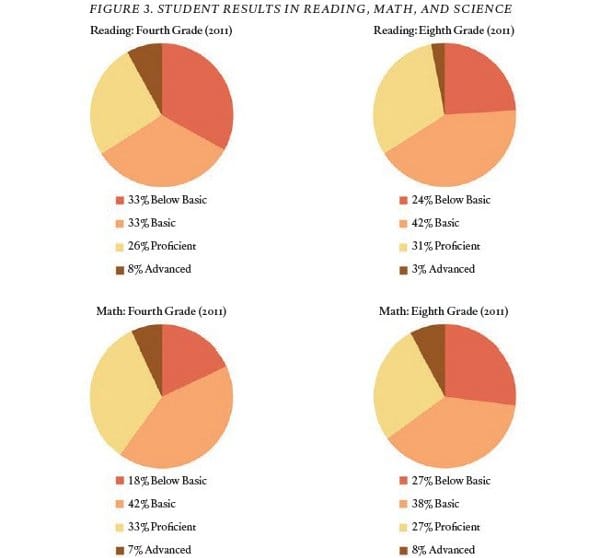Substandard American Education Threatens National Security

Credit: cfr.org

The continued failure of the United States to provide decent education to its citizens threatens national security, says a recent report by the Council on Foreign Relations (CFR.) The study was co-chaired by Joel I. Klein, former head of New York City public schools and Condoleezza Rice, former US Secretary of State.
The report is blunt about the national security threats due to the US continually falling behind in education:
The lack of preparedness poses threats on five national security fronts: economic growth and competitiveness, physical safety, intellectual property, U.S. global awareness, and U.S. unity and cohesion, says the report. Too many young people are not employable in an increasingly high-skilled and global economy.
The Organization for Economic Cooperation and Development says US high school students ranked 25th in math, 17th in science and 14th in reading compared to students from other industrialized nations. Incredibly, we aren’t even keeping up with student s in developing nations.
Part of the problem may be that colleges are stuck in old modes of thinking and acting while the world passes them by.
unsustainable business model
The mantra from the educational community is online classes aren't effective at teaching and that only face-to-face teaching can work. But venture capital is investing heavily in digital education. Bricks and mortar universities can and must change now with the times or face becoming obsolete. If they keep raising tuition so only a tiny few can afford education, then we will have a two-tiered class system where upward mobility will become difficult if not impossible.
The CFR is clear on what the problem is but their solutions seem a bit fuzzy , with no clear idea how to implement t them or where funding will come from.
CFR proposes:
Implement educational expectations and assessments in subjects vital to protecting national security. "With the support of the federal government and industry partners, states should expand the Common Core State Standards, ensuring that students are mastering the skills and knowledge necessary to safeguard the country's national security."Make structural changes to provide students with good choices. "Enhanced choice and competition, in an environment of equitable resource allocation, will fuel the innovation necessary to transform results."Launch a "national security readiness audit" to hold schools and policymakers accountable for results and to raise public awareness. "There should be a coordinated, national effort to assess whether students are learning the skills and knowledge necessary to safeguard America's future security and prosperity.”
It’s clear that American students are not learning the skills they need and that everyone knows this. But the problem seems so vast that no one is quite sure how to solve it. But solve it we must.



